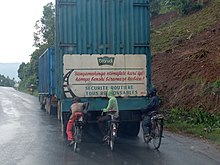| Rundi | |
|---|---|
| Ikirundi | |
| Native to | Burundi |
| Ethnicity | Hutu Tutsi Twa Ganwa |
Native speakers | 13 million (2021)[1] |
| Dialects |
|
| Latin | |
| Official status | |
Official language in | |
| Language codes | |
| ISO 639-1 | rn Rundi |
| ISO 639-2 | run Rundi |
| ISO 639-3 | run Rundi |
| Glottolog | rund1242 Rundirund1241 Rundi-Kitwa |
JD.62[2] | |
| Person | Umurundi |
|---|---|
| People | Abarundi |
| Language | Ikirundi |
| Country | u Burundi |
Kirundi, also known as Rundi, is a Bantu language and the national language of Burundi. It is a dialect of Rwanda-Rundi dialect continuum that is also spoken in Rwanda and adjacent parts of Tanzania (in regions close to Kigoma), the Democratic Republic of the Congo, Uganda, as well as in Kenya. Kirundi is mutually intelligible with Kinyarwanda, the national language of Rwanda, and the two form parts of the wider dialect continuum known as Rwanda-Rundi.[3]
Kirundi is natively spoken by the Hutu, including Bakiga and other related ethnicities, as well as Tutsi, Twa and Hima among others have adopted the language. Neighbouring dialects of Kirundi are mutually intelligible with Ha, a language spoken in western Tanzania.
Kirundi is one of the languages where Meeussen's rule, a rule describing a certain pattern of tonal change in Bantu languages, is active.
In 2020, the Rundi Academy was established to help standardize and promote Kirundi.[4]

- ^ Rundi at Ethnologue (27th ed., 2024)

- ^ Jouni Filip Maho, 2009. New Updated Guthrie List Online
- ^ Kirundi at Ethnologue (15th ed., 2005)

- ^ Rigumye, Mariette. "Longtemps attendue, l'Académie Rundi ouvre sous peu". IWACU (in French). Archived from the original on 2020-11-04. Retrieved 2021-09-10.